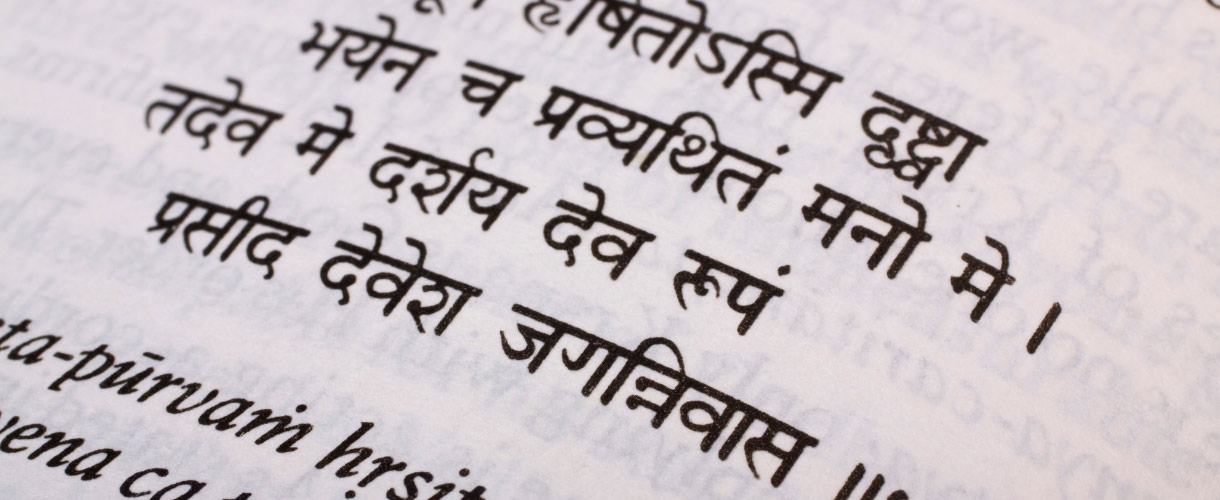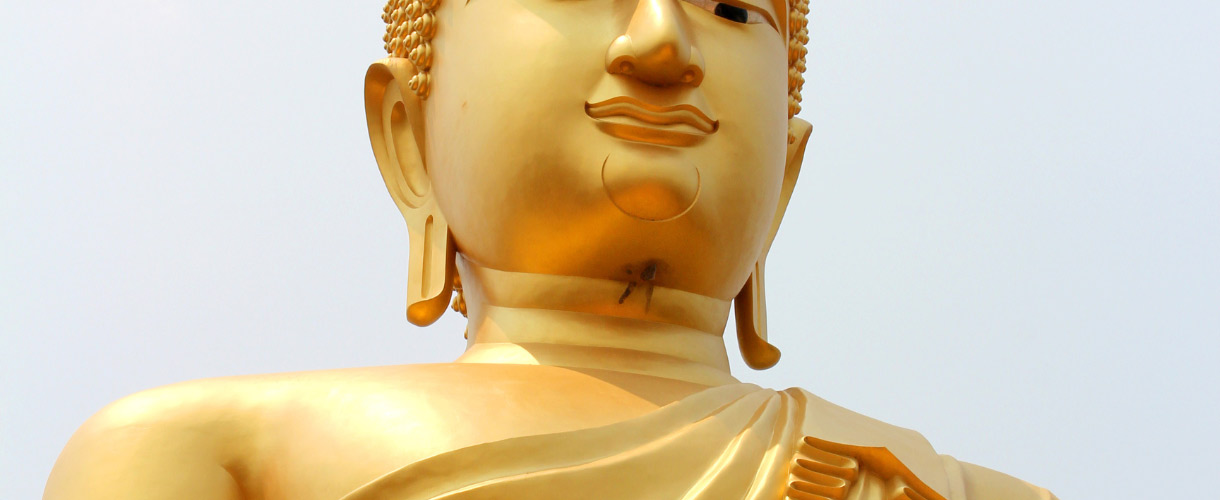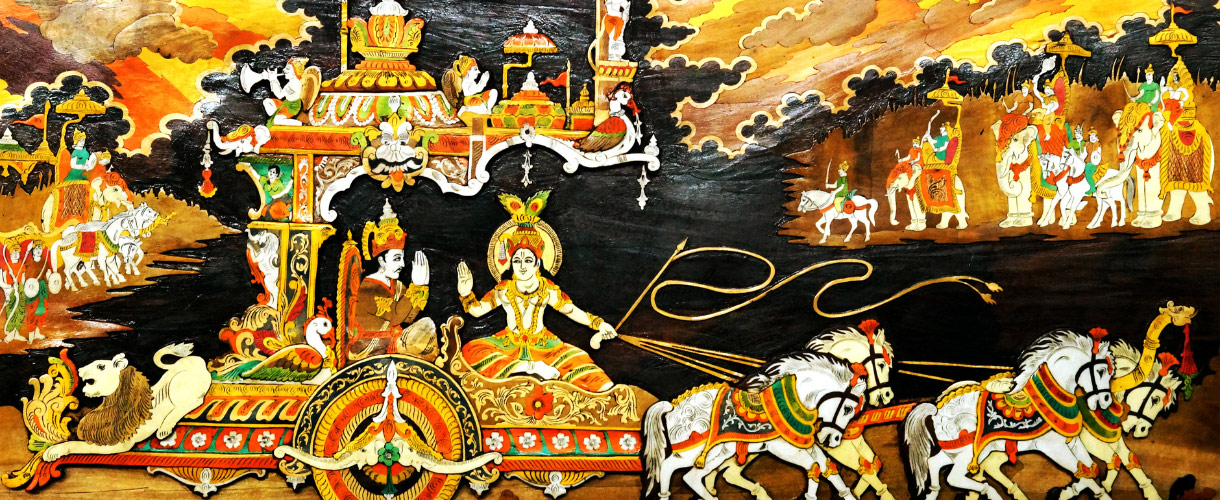Chapter 2 of the Bhagavad Gita, translated by Shanti Gowans.
2. The Path of Self Knowledge, Sankhya Yoga
Filled with lamentation, grief, and despair, Arjuna seeks help from Krishna, his deeper being. This chapter is often considered the summary to the entire Bhagavad Gita. Arjuna is instructed into various subjects such as karma yoga, jnana yoga, sankhya yoga, buddhi yoga and the reality of immortal, eternal nature of the presence (atma), existing within all living entities.
This chapter, Sankha Yoga, The Book of Doctrines is comprised of 72 verses. (Sankhya here refers to one of six orthodox schools of Vedic Philosophy).
Chapter 2: The Practice of Yoga
Verse numbers printed within the brackets refer to the Sanskrit text.
As Arjuna sat there,
agitated. overwhelmed with pity,
his eyes filled with tears
and full of sorrow, (1)
Krishna spoke to him saying:
Arjuna, why has this timidity overtaken you
at this time of crisis?
It is unworthy of a noble mind.
It is shameful
and will not lead to heaven. (2)
Do not yield to cowardice, Arjuna;
it does not become you.
Shake off this paltry faint-heartedness.
Stand up like a man. (3)
Arjuna said:
How Krishna, shall I fight Bhishma and Drona
with arrows on the battlefield?
They are worthy
of my deepest reverence. (4)
It would be better for me to spend the rest of my life
as a pauper in this world, begging for food,
than to kill these honoured teachers,
because after killing them
all my earthly pleasure
including wealth and sensory enjoyment
will be stained with blood. (5)
We do not even know which is better for us
to fight or not to fight;
which is worse, winning the battle or losing it.
If we kill Dhritarashtra’s men who stand before us in the enemy ranks,
we will not even wish to remain alive. (6)
I am weighed down with pity and faintheartedness
and my mind is utterly confused.
Please tell me where my duty lies, which path I should take.
I am your pupil and have placed myself in your hands.
I beg you for your instruction. (7)
I cannot imagine that
even upon obtaining undisputed sovereignty and affluence
on this earth and of all of the gods in heaven,
do I see any means that can drive away this grief
which is withering my senses. (8)
Having thus spoken to Krishna,
Arjuna said, “I will not fight,” and fell silent. (9).
As Arjuna sat there, sorrowing and downcast,
between the two armies,
Krishna, smiled at him and then said: (10)
Arjuna, you mean well,
and speak like the learned,
yet you grieve over that which should not be grieved for.
Wise beings do not grieve over for dead
or the living. (11)
In fact, there was never a time
when I or you did not exist,
or these kings.
Nor will there come a time
when we will cease to be. (12)
The in-dwelling Consciousness in a body-mind organism
passes through the stages of childhood, youth and old age.
Similarly, the same in-dwelling Consciousness, at the time of death,
attains another body.
The wise are not concerned with this phenomenon.
Your sorrow is sheer delusion. (13)
The in-dwelling Consciousness is the impersonal Consciousness which is the same life source in every living creature. This impersonal Consciousness is not concerned with the various stages in life through which the body-mind organism passes as a natural process. Nor is it concerned with the process beyond death, when it gives up one body and enters into another conception, another body.
It is the identified consciousness, the ego, which is very much concerned not only with the various stages in life – especially the loss of youth and the approach of old age, but also beyond death, the fear of the unknown.
Feelings such as heat and cold, pleasure and pain,
are the result of the contact between the senses and their respective objects.
They are transitory. They come and go.
All you need to do is to accept them as such,
without getting involved in them. (14)
External objects bring about a reaction in a body-mind organism only when they come in contact with the respective senses. It is also clear that the same object can bring about different reactions in different human organisms. What is attractive for one may not be attractive to another. What seems attractive at one time may also seem oppressive at another. The point is that reactions of the senses to their respective objects are different and keep changing; also, they come and go. When they are seen in this perspective, they lose their influence to cause undue pleasure or pain. One can accept the changes as they occur with equanimity.
Only the wise person who is unmoved by these sensations,
and is indifferent to pain and pleasure is eligible for immortality. (15)
The unreal has no existence;
and the real never ceases to be;
both these statements are obvious
to those who have seen the truth. (16)
Nothing is as it seems.
The presence which pervades this universe
is imperishable, unchanging,
both is and is not,
how could it ever vanish? (17)
All things are possible.
All these bodies are perishable and come to an end,
but the in-dwelling Consciousness is imperishable, indefinable and eternal,
and no one has the power to destroy the indestructible substance;
therefore Arjuna, fight. (18)
Thoughts such as
this in-dwelling Consciousness can kill or that it can be killed
are both ignorant,
and you do not understand reality’s subtle ways,
for verily the in-dwelling Consciousness neither kills nor is killed. (19)
It was never born nor dies;
nor does it become, or come to be,
and it will never not be.
For it is birthless, primordial, everlasting and timeless;
it does not die when the body dies. (20)
Knowing that the in-dwelling Consciousness is eternal
and free from birth, decay and imperishable,
how could you ever kill?
and whom could you kill? (21)
As a person casts off worn-out clothes
and dons other new ones,
likewise the in-dwelling Consciousness
casts off worn-out body-mind equipment
and enters into new ones. (22)
The in-dwelling, impersonal Consciousness is the life source of all living beings, not the ego-centre. It is this impersonal consciousness which casts off worn-out body-mind equipment and enters into new ones as part of general evolution.
Weapons cannot cleave it,
fire cannot burn it,
water cannot wet it,
wind cannot dry it. (23)
It is incapable of being cut or singed,
it is impervious to water,
nor can wind cause it to wither.
The in-dwelling Consciousness
is all-pervading, immovable, constant and timeless. (24)
It is unmanifest, unthinkable
and spoken of as immutable.
Therefore, if you understand it this way,
you have no reason to grieve. (25)
However, Arjuna, even if you should think that
the in-dwelling Consciousness
to be subject to constant birth and death,
there is still no reason for you to grieve like this. (26)
Death is certain for the born,
and rebirth is inevitable for the dead.
Since both cannot be avoided,
you have therefore, no reason for your sorrow. (27)
Creativity and decay are two major forces in life.
They are both natural laws of existence.
People die, plants die, animals die, ways of life die,
Every change is a little death…
and yet a part of us lives on.
Death is nothing but a falling leaf,
the tree in us still stands.
We are time, we are life and we are change.
Your shattered pieces and failed tries,
your burns, scalds and midnight cries
are alchemised into more life.
Start before you are ready
Your only time is now.
Your smaller self is not yet ready to be more.
Your higher self is already more.
Your fear is the only bridge between the two.
Cross it.
When one thing passes,
the creator does not hold on to the caterpillar’s corpse,
it turns itself into a whole new creature,
powerful enough so that the flapping of its wings
can cause a hurricane on the other side of the world.
That butterfly? That’s you.
Beings are not manifest to our human senses before birth.
During the interim period between birth and death they are manifest.
They again return to the unmanifest at death.
In this natural process what is there to grieve over? (28)
People and events appearing in one’s dream did not exist before the dream started and will again disappear when the dream ends. No one grieves over this phenomenon. Why grieve over a similar phenomenon in life, in this living dream?
When the potential energy of the unmanifest activised itself into the manifest universe, the manifestation came into existence. When the burst of energy exhausts itself after billions of years, the manifest universe again subsides into the potential energy of the unmanifest, until it activises itself again. This is a perfect natural process which should not be of any concern to a person of discernment.
Myriad forms of life emerge only to turn to a primal non-being before entering again to some form of living – a kind of re-cycling. Thus nature would seem to be a rhythmic, pulsation, ever-changing and transforming, coming to birth and dying and coming to birth again. Wisdom consists in learning conformity to the universal rhythm.
Some perceive it directly, in all its awesomeness,
others speak of it with wonder,
and others hear of it and yet never know it. (29)
The in-dwelling Consciousness
present within all living body-mind organisms
is invulnerable, forever indestructible.
Therefore there is really no need to mourn for anyone, Arjuna. (30)
There is a subtle distinction between mourning for someone and reacting emotionally to the loss of a near relative or friend. It is natural for the body-mind organism to react to the loss of someone close, dear, or over a long period of time. While such a spontaneous reaction is perfectly natural, prolonged mourning or grieving over a period is a matter of ego involvement through identification with the body. In other words, while an emotional reaction is perfectly natural, an involvement is a matter of ignorance.
Know what your own duty is
and do it without hesitation.
For a warrior, there is nothing better
than a battle that duty enjoins. (31)
Blessed are the warriors
who get such an unsolicited opportunity for battle such as this,
which calls them to do what is right
and opens the gates of heaven. (32)
The obstacle is the way…
The impediment to action advances action.
What stands in the way becomes the way.
Letting go is the most powerful act
of faith, vulnerability and surrender.
Now, if you refuse the call of this righteous war,
and shirk from what your duty and honour dictate,
you will bring down ruin on your head. (33)
Decent men, for all time
will talk about your disgrace,
and disgrace for a man of honour
is a fate worse than death. (34)
The great heroes, all those who once esteemed you,
will think that fear had driven you from battle,
and will think of you with contempt. (35)
And your enemies will sneer and mock you,
disparaging your might,
with many unbecoming words.
What can be more distressing than this? (36)
Die and you gain heaven;
triumph and you gain the earth;
therefore, stand up, Arjuna,
steady your mind to fight. (37)
Indifferent to victory and defeat,
gain and loss,
pleasure and pain,
prepare yourself for battle
and do not succumb to sin. (38)
Arjuna, this attitude of mind has been presented to you
from the point of view of Jnana yoga (philosophy’s wisdom);
now hear the same as presented
from the standpoint of Karma yoga (the yoga of selfless action).
Equipped with this understanding,
you will be able to completely shatter your karmic bonds. (39)
In this path of disinterested action (Karma Yoga)
no effort is lost, even if it is an abortive one.
Nor is any gain ever reversed.
Even a little of this practice will shelter you
from the terrible fear of death and rebirth. (40)
This verse brings out the difference between what happens in the phenomenal working of life and the transcendental effort. While effort in usual life could be wasted or even bring about an adverse effect, this is not the case for any effort made in the acquisition of the knowledge and practice of karma yoga or selfless action. A partial effort in raising a crop would be wasted if the process is not duly completed. Also, if a patient takes the wrong medicine, there could be an adverse effect. But the practice of Karma Yoga is on a different footing altogether. The very wanting to undertake Karma Yoga is because of divine graciousness, and thus progress in the process is also a result of the same. The remarkable thing about this Yoga process is that nothing done is ever wasted, nor does it have any adverse effect. The process goes on. The speed of it will depend on the destiny of the individual organism, through which the process goes on.
Arjuna, in this yoga (of disinterested action)
resolute understanding is single-pointed;
whereas the thoughts of the irresolute (ignorant people moved by desires)
wander in all directions, after innumerable aims. (41)
Foolish people talk of religion
in cheap, sentimental words,
leaning on the scriptures
to argue that there is nothing beyond them.
Deeply attached to pleasure, and driven by power,
they utter flowery speech,
and are caught up in rituals of various kinds;
they strive to gain heaven,
but rebirth is the only result of their striving.
Lured by their own desires,
besotted by scriptures’ words,
their minds have not been made clear
by the practice of meditation. (42-44)
The scriptures dwell in duality
and deal with the evolutes of the three qualities of nature.
Be indifferent to these worldly enjoyments
and the means of attaining them.
Rise above the pairs of opposites
such as pleasure and pain,
(loss and gain, failure and success, fame and shame),
anchored in the real,
free from all thoughts of wealth and comfort. (45)
As unnecessary as a well is
to a village on the banks of a river,
so unnecessary are all scriptures
to someone who has seen the truth. (46)
For the spiritual seeker, the Vedas are the prime source of true knowledge and everyone must go to the sacred book for knowledge, just as a villager must normally go to the well for his daily supply of drinking water. But when the area is flooded, the reservoir itself becomes merged in the spread of water around. Similarly, the Vedas are useful only until the seeker has reached a certain level of understanding, only until the individual is not free from the desire for sensual satisfaction. But to the seeker who has come to experience the all-pervading Presence, the knowledge of the Vedas has become submerged in the perfection of the in-dwelling Consciousness, which the adept actually lives in practice.
Act for the action’s sake.
You have a right to your actions,
but never to the fruit thereof…
and do not let this fact
make you lean towards inaction. (47)
This verse asks us to act without motivation. Even though we might believe we have free will, when we have no control over our thoughts and emotions, what we consider as our actions are in fact only reactions of the individual organism to an outside impulse: a thought which occurs, an incident or event that we witness that we react to according to the natural characteristics with which the organism has been programmed: physical, mental, intellectual, temperamental.
Self-possessed, resolute,
act without any thought of results,
open to success and failure.
This equanimity is Yoga. (48)
Action is far inferior to the Yoga of insight.
Pitiful are those who, acting,
are attached to their action’s fruits. (49)
Endowed with equanimity,
the wise person lets go of all results,
whether good or bad,
and is focused on the action alone.
Yoga is skill in actions. (50)
The wise person whose insight is firm,
relinquishing the fruit of actions,
is freed from the bondage of rebirth,
and attains the blissful supreme state,
beyond all sorrow. (51)
When your understanding
has passed beyond the mire of delusion,
and you have grown indifferent
to the enjoyments of this world and the next,
there is nothing you need to learn from
even the most sacred scripture. (52)
Indifferent to scriptures, your mind will rest,
undistracted, unmoving, absorbed in deep meditation.
This is the essence of Yoga. (53)
Arjuna said:
How would you describe the person
whose wisdom is steadfast, stable and established in perfect tranquillity?
How does a wise person speak?
How does he sit, stand, walk? (54)
The blessed Lord said:
Arjuna, when a person thoroughly gives up
all desires that emerge from the mind,
and rests, contented in the Self
through (the joy of) the Self,
he is called a person of firm wisdom. (55)
He, whose mind remains untroubled amidst misfortune,
whose craving for pleasures has altogether disappeared,
and who is free from greed, fear and anger,
is called stable of mind. (56)
He who is unattached to everything,
and neither rejoices nor recoils
if good or bad things happen,
he is a person of firm wisdom. (57)
When like a tortoise,
which draws in its limbs from all directions,
he withdraws his senses from the sense objects,
he is a person of firm wisdom. (58)
Sense-objects fade from him
who does not enjoy them with his senses,
yet the craving for them persists,
but even this craving vanishes
for someone who has seen the truth. (59)
At first, although he continually tries to subdue them,
the turbulent senses tear at his mind
and forcibly carry it away, Arjuna. (60)
Therefore, having restrained his senses,
collecting his mind,
he should sit for meditation,
devoting himself heart and soul to Me.
The person whose senses are mastered,
is a person of firm wisdom. (61)
The person dwelling on sense-objects
develops attachment to them;
from attachment springs up desire,
and from desire (unfulfilled) anger is born. (62)
From anger confusion arises,
from confusion, weakness of memory,
from weak memory, loss of reason,
and from loss of reason
he goes into complete ruin. (63)
But the person who is self-controlled,
while enjoying the various sense-objects
through his senses which are disciplined,
and free from craving and aversion,
attains serenity at last. (64)
With the attainment of such serenity of mind,
all his sorrows disappear,
at once and forever,
and the intellect of such a person of tranquil mind
soon withdraws itself
and his understanding is steadfast. (65)
The undisciplined,
who have not controlled their mind and senses
can have no wisdom;
no one-pointed concentration…
with no concentration, no peace.
How can there be joy for one lacking peace of mind? (66)
When the mind
constantly runs after the wandering senses,
it drives away his discrimination,
just as the wind blows a ship off course. (67)
Therefore Arjuna,
when someone is able to completely restrain his senses
from every object of sensation,
he is a person of firm wisdom. (68)
In the night to all beings,
the wise person (in that state of divine knowledge and supreme bliss) keeps awake,
and sees only the radiance of the in-dwelling consciousness;
but the sense world (the ever-changing, transient, worldly happiness)
in which all beings keep awake,
is for him as dark as night. (69)
In this verse, the view of the world as seen by the identified individual and that of the awakened jnani are contrasted. To the ignorant individual whatever is perceived by the senses and the thinking mind appears real and is taken as real. To the sage on the other hand, whatever appears is not real: whatever appears is ony the changeable appearance of the unperceived Real. In other words, the egocentric, identified individual, fully awake to the world of perception, is asleep to the real in-dwelling consciousness, lived and enjoyed by the sage. As long as the individual remains in his world of desires, the Real, the indwelling consciousness remains a total mystery to him. It is only when he realises that the mind is nothing but a series of desires which never ends, that the possibility of his awakening from the night of identification with the senses, into the world of the jnani.
Ramana Maharshi said, “There are only two things: sleep and creation. There is nothing if you go to sleep; you wake up and there is everything. If you learn to ‘sleep’ when awake, you can be just a witness. This is the real truth.”
As the waters of the different rivers enter the ocean,
which though filled, yet remains undisturbed,
likewise the person in whom all enjoyments merge themselves,
attains peace;
not he who hankers after such enjoyments. (70)
The person who has abandoned all desires,
and acts without attachment,
egoism (thoughts of “I” and “mine”)
and thirst for enjoyment,
attains utter peace. (71)
This is the divine state, Arjuna.
Having reached this state,
a person overcomes delusion.
And established in this state,
even at the moment of death,
he vanishes into divine bliss. (72)







